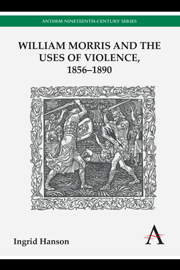Book contents
- Frontmatter
- Contents
- Acknowledgements
- Introduction Warriors Waiting for the Word
- Chapter One The Early Romances and the Transformative Touch of Violence
- Chapter Two Knightly Women and the Imagination of Battle in The Defence of Guenevere, and Other Poems
- Chapter Three Sigurd the Volsung and the Parameters of Manliness
- Chapter Four Crossing the River of Violence: The Germanic Antiwars and the Uncivilized Uses of Work and Play
- Chapter Five ‘All for the Cause’: Fellowship, Sacrifice and Fruitful War
- Afterword ‘Hopeful Strife and Blameless Peace’
- Notes
- Bibliography
- Index
Introduction Warriors Waiting for the Word
Published online by Cambridge University Press: 05 July 2013
- Frontmatter
- Contents
- Acknowledgements
- Introduction Warriors Waiting for the Word
- Chapter One The Early Romances and the Transformative Touch of Violence
- Chapter Two Knightly Women and the Imagination of Battle in The Defence of Guenevere, and Other Poems
- Chapter Three Sigurd the Volsung and the Parameters of Manliness
- Chapter Four Crossing the River of Violence: The Germanic Antiwars and the Uncivilized Uses of Work and Play
- Chapter Five ‘All for the Cause’: Fellowship, Sacrifice and Fruitful War
- Afterword ‘Hopeful Strife and Blameless Peace’
- Notes
- Bibliography
- Index
Summary
In an 1896 obituary, the socialist writer Edward Carpenter recalled the last time he had seen William Morris, at the Paris Congress in 1889. He described how he watched him, ‘fighting furiously there on the platform with his own words (he was not feeling well that day), hacking and hewing the stubborn English phrases out.’ His speeches, Carpenter averred, were ‘a trump of battle’, and he himself a ‘brusque, hearty, bold and manly form’. He ‘stood up from the first against the current of ugly, dirty commercialism […] like a captain in the rout of his men withstanding the torrent of their flight and turning them back to the battle’. Walter Crane uses similar metaphors in his ‘Sonnet on the Death of William Morris’, calling him a ‘skilled craftsman’ in both art and song, ‘Whose voice by beating seas of hope and strife / Would lift the soul of Labour from the knife’. The poem laments that Morris should die while yet with battle-cries the air is rife’. Both the language of battle and Crane's emphasis on the combination of craftsmanship, orality, hope and strife draw on Morris's own characteristic language, picking up images and ideas that run prominently through his writings and shape his personal, political and artistic vision.
They are ideas clearly articulated in Morris's poetic Prologue, ‘Socialists at Play’, written for a gathering of the Socialist League at South Place Institute in 1885, and recorded by May Morris in her memoir of her father:
War, labour, freedom; noble words are these;
But must we hymn them in our hours of ease?
We must be men.
- Type
- Chapter
- Information
- William Morris and the Uses of Violence, 1856–1890 , pp. ix - xxiiPublisher: Anthem PressPrint publication year: 2013



